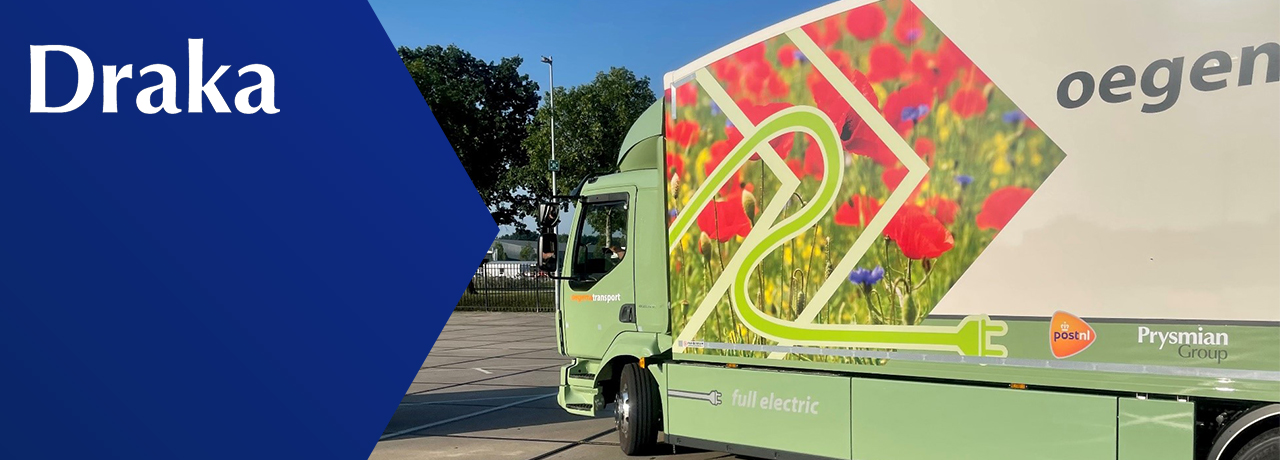From electric cranes to electric box trucks and beyond
Draka and Oegema join forces on their way to emission-free transport
For Draka, 2023 was also all about the road to emission-free transport. Where an electric crane was previously used for part of the cable transports, new steps were taken through combined transport and the use of electric box trucks, among other things. Henk-Jan Holtrop, Warehouse Manager at Draka location Emmen and Erwin Jacobs, Fleet Manager and SHQE Manager for Transport, explain the initiatives.
Draka is part of Prysmian Group. The focus on sustainability and CO2 emissions is in the DNA of this world leader in the cable industry. SBTi's goal of being completely CO2 neutral by 2050 also includes emission-free transport. We work on this every day with logistics partner Oegema Transport, among others.
Shared Commitment to Sustainability
Collaboration between Draka and Oegema Transport has grown into a serious relationship over the years. Henk-Jan Holtrop explains: "It is a partnership in various areas, not only in the field of transport, but also in the field of storage. The joint commitment to operational efficiency and sustainability is also a unifying factor." Erwin Jacobs adds: "For more than fifteen years, we have been researching and experiencing the possibilities of emission-free transport."
Low-loader with full-electric crane
The collaboration between Draka and Oegema leads to visible results in the field of more sustainable transport. Henk-Jan: "We have taken a great step this year thanks to the use of the Oegema semi low-loader, which is equipped with a full-electric crane. Part of the Draka cable transports are exclusively provided by this smart combination. On an annual basis, this saves 6 tonnes of CO2 emissions."
Combining transport, saving 52 tonnes of CO2 per year
Another smart sustainable adjustment that was implemented this year is the combination of transport modes. Henk-Jan: "The supply from our Telecom and Energy Cable sales offices was done with separate trucks. That was actually how it had grown historically. We did a trial to combine this transport to the construction site. Of course, adjustments were needed, but it can be done. This saves one trailer per week on the road and saves 52 tonnes of CO2 per year."
Use of electric box trucks
Earlier this year, together with Oegema Transport, we also looked at how distribution around the Draka factory could be made more sustainable. Erwin Jacobs: "From 2025, a large number of Dutch cities will have zero-emission zones. From 2040, diesel trucks will no longer be allowed to be sold in Europe. This is one of the reasons why we have had two electric box trucks on the road for some time now. That is also a learning process, because you have to deal with less payload, for example. Draka is one of the customers who is working with us on this process." Henk-Jan: "Customers in the 'North region' are now supplied with these electric rigids. Several companies use the box trucks during a shipment. In about nine weeks, about 50 shipments were sent from Draka."
Next step: use of E-truck
Draka and Oegema are constantly looking at how transport can be smarter and greener. There is therefore even more logistical sustainability on the horizon. Henk-Jan: "What I am personally very proud of is the use of an E-truck from Oegema Transport for FTL transport to the south of the country. Initially, this will be used for trips to Technische Unie's distribution centre in Alphen aan de Rijn. This is unique in the Netherlands. The expectation is that this will save around 45 tonnes per year in CO2 emissions."
Investing and learning together
Draka and Oegema Transport have the same sustainable ambitions and are therefore working together. Erwin Jacobs: "That requires investment and the will to experience and learn. Our goal is to have around 25 electric trucks on the road by 2025. Of course, this includes a large charging facility. We have already invested in a charging plaza, equipped our buildings with a total of 12,500 solar panels and we use a 3.2 megawatt battery. Of course, the trucks themselves are also more expensive than fuel-powered trucks. But it's the future and that's what we're investing in. The fact that Draka is also doing this is of course very nice." Henk-Jan: "We want to be progressive and at the forefront of the market. That means looking at smarter and greener transport every day and actually daring to take steps."



